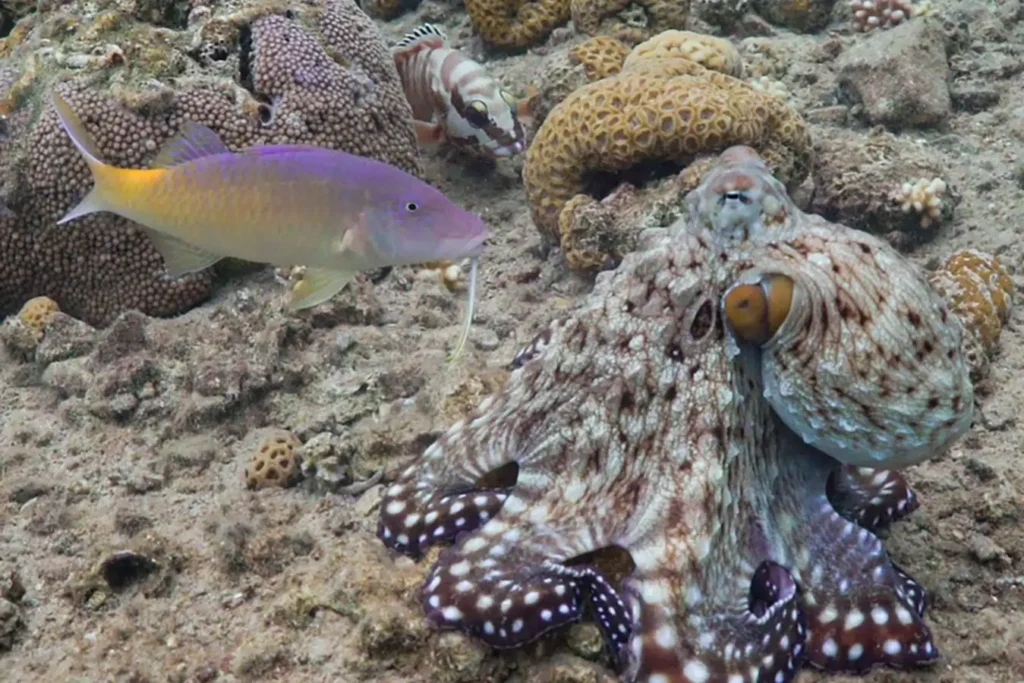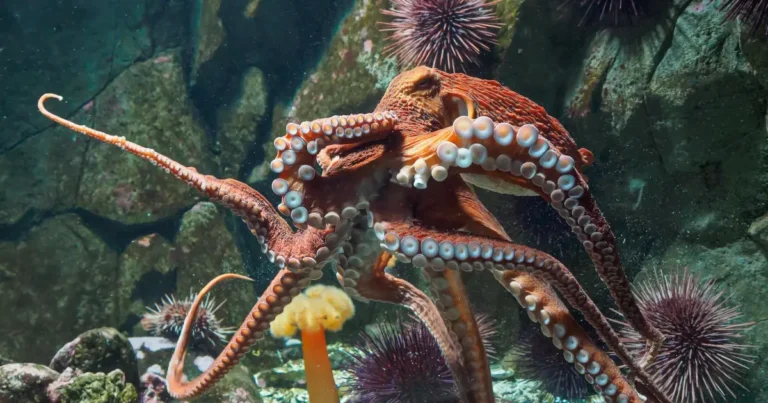Have you ever imagined an octopus throwing a punch? It might sound like something out of a cartoon, but in the vibrant underwater world of the Red Sea, this bizarre behavior is very real. Scientists have recently uncovered a fascinating explanation for why these intelligent cephalopods sometimes deliver a swift hit to their fishy neighbors. Let’s dive into the depths of this intriguing discovery and explore the complex social dynamics at play beneath the waves.
The Unexpected Collaboration: Octopuses and Fish Team Up
When you think of hunting partnerships in the animal kingdom, octopuses might not be the first creatures that come to mind. However, recent observations have revealed that day octopuses in the Red Sea often engage in collaborative hunts with various predatory fish species. This unexpected alliance has piqued the interest of marine biologists and animal behavior experts worldwide.
National Geographic Explorer Eduardo Sampaio and his team set out to investigate this peculiar phenomenon. They were particularly intrigued by reports of octopuses seemingly punching their fish companions during these joint hunting expeditions. But why would an octopus risk alienating its hunting partners with such aggressive behavior?
The Hunt Unveiled: A Closer Look at Underwater Teamwork
To unravel this mystery, Sampaio and his colleagues embarked on an ambitious project. They deployed two camera rigs in the Red Sea to capture these interspecies hunting parties in action. After meticulously reviewing over 100 hours of underwater footage and reconstructing the scenes using computer software, the researchers made some groundbreaking observations.
The hunting groups typically consisted of a single octopus accompanied by two to ten fish of various species. This diverse team of predators worked together to flush out and capture prey more efficiently than they could alone. But how exactly does this collaboration work?
The Role of Each Hunter
In this underwater alliance, each member plays a crucial role:
- The Fish Scouts: Active predators like goatfish take on the role of scouts. They swim ahead, searching for potential prey and alerting the group to food sources.
- The Octopus Lockpicker: The octopus serves as the team’s “lockpicker.” With its incredible flexibility and problem-solving skills, it can reach into crevices and uncover hidden prey that might be inaccessible to its fish companions.
This division of labor allows the group to cover more ground and access a wider variety of prey than either the octopus or the fish could manage on their own. It’s a win-win situation – or at least it should be.
The Plot Twist: When Teamwork Breaks Down
As with any group effort, sometimes things don’t go according to plan. This is where the infamous octopus punch comes into play. But why would an octopus risk disrupting this mutually beneficial arrangement?
The answer lies in the behavior of certain fish species, particularly the blacktip grouper. These ambush predators have a tendency to hang back and wait for prey to come to them – a strategy that can slow down the entire hunting group.
Sampaio’s team observed that in about half of the instances when a grouper was present during a hunt, it ended up on the receiving end of an octopus punch. This suggests that the octopus isn’t randomly lashing out but is specifically targeting fish that aren’t pulling their weight in the collaborative effort.

The Octopus as Enforcer: Maintaining Order in the Ranks
Based on these observations, Sampaio and his colleagues have proposed a compelling theory: the octopus acts as an enforcer, using its punches to keep the fish in line and ensure smooth collaboration during the hunt.
This behavior showcases the octopus’s remarkable cognitive abilities. Not only can these cephalopods differentiate between cooperating and non-cooperating partners, but they also seem to understand the concept of fairness in group dynamics. By discouraging free-riders, the octopus helps maintain the efficiency of the hunting party.
Debating the Findings: Not Everyone is Convinced
As with any groundbreaking scientific discovery, Sampaio’s findings have sparked debate within the scientific community. Some experts, like octopus cognition specialist Jennifer Mather from the University of Lethbridge, have raised questions about the interpretation of the observed behaviors.
Mather suggests an alternative explanation: the octopus might simply be acting like a “bulldozer,” stirring up the environment and scaring prey in all directions. In this scenario, the fish would be opportunistic followers rather than true collaborators.
However, other researchers, such as Alexandra Schnell from the University of Cambridge, find Sampaio’s hypothesis plausible. Schnell points out that it’s not far-fetched to imagine that fish and octopuses have learned to hunt together for mutual benefit, given the complex cognitive abilities of octopuses.
Related Stories
The Benefits of Collaboration: Why Team Up?
If Sampaio’s theory proves correct, it offers intriguing insights into the advantages of this unusual partnership:
- Energy Conservation: By working together, both the octopus and the fish can explore a larger area more quickly than they could alone. This efficiency allows them to save energy for other important activities like reproduction, social interaction, and den maintenance.
- Increased Success Rate: The combination of the fish’s scouting abilities and the octopus’s problem-solving skills likely results in more successful hunts overall.
- Access to Diverse Prey: The partnership allows both the octopus and the fish to access a wider variety of prey items than they might encounter hunting solo.
Unresolved Mysteries: Questions for Future Research
As fascinating as these findings are, they’ve also opened up a whole new set of questions for marine biologists to explore:
- Color Communication: Does the octopus’s black-and-white coloration serve as a warning sign to the fish? Could it be a way of saying, “Shape up or face the consequences”?
- Fish Recognition: Can octopuses distinguish between individual fish? Do they have preferred hunting partners?
- Long-term Relationships: Given that many fish species can live for decades, is it possible that octopuses form long-lasting hunting relationships with specific individuals?
- Cultural Transmission: Is this collaborative hunting behavior learned and passed down through generations of octopuses and fish?
The Bigger Picture: What This Means for Our Understanding of Marine Life
This research not only sheds light on the complex social lives of octopuses but also challenges our perceptions of marine ecosystems. It demonstrates that underwater food chains are not simply linear progressions of predator and prey, but intricate webs of relationships that can include cooperation across species boundaries.
Moreover, the study underscores the remarkable cognitive abilities of octopuses. These creatures, with their distributed nervous systems and alien-like appearance, continue to surprise us with their problem-solving skills, adaptability, and now, their capacity for complex social interactions.
Conclusion: A New Frontier in Marine Biology
The discovery of octopuses punching fish during collaborative hunts opens up exciting new avenues for research in marine biology and animal behavior. It reminds us that the underwater world is full of surprises, waiting to be uncovered by curious scientists and nature enthusiasts alike.
As we continue to explore the mysteries of our oceans, who knows what other unexpected partnerships and behaviors we might discover? The story of the punching octopus serves as a powerful reminder of the complexity and wonder of life beneath the waves – and the importance of preserving these rich ecosystems for future generations to study and enjoy.
So the next time you’re snorkeling or watching a nature documentary, keep an eye out for octopuses. You never know – you might just witness one of these eight-armed enforcers keeping its fishy teammates in line with a well-timed uppercut!



Comments are closed.